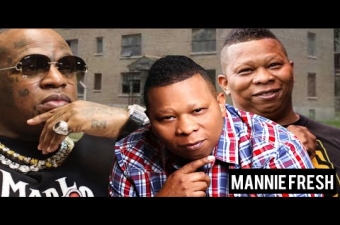Club Rumors / Club Discovery
2831 St. Claude Ave.New Orleans LA 70117
Club Rumors, originally called Club Discovery, was one of New Orleans’ most important hip-hop venues from 1988 to 1997, where No Limit Records and Cash Money Records each found in-house producers that would help carry them to national renown. Filled with 1,000 people or more on weekend nights, the city’s top DJs and artists came here to break songs and level up in the music industry.
The Ninth Ward club got so popular so quickly that even the conservative Times-Picayune took notice a few months after it opened:
A doorman opens the door to Discovery … Upstairs, there’s a disco with DJs Captain Charles and Dave Geno (from Brooklyn) playing R&B hits … But that’s not all. There’s a game room, with pool tables and basketball hoops, and yet another bar.
[Co-owner Pete Dimitri] says the club draws “a mature black crowd between 25 and 40. We have a lot of Saints come by. Fats Domino is a serious regular.”
… Two nights a week the “best dressed” woman, man, and couple win champagne dinners for two at the seafood restaurant downstairs.
Captain Charles was a major draw in the club’s early years. “We went from the R&B to gangsta rap to the New Orleans bounce…I was in the middle of that transition of music,” he told A Closer Walk. When bounce emerged in 1991, he says, “I was the one breaking all those songs.” His sets at Discovery also led to radio play for the Rebirth Brass Band’s crossover hit “Do Whatcha Wanna.”
Gerald Platenburg, one of the city’s best-known second line dancers, recalled the scene in Coming Out the Door for the Ninth Ward:
If you didn’t get there early, you would be in that line for at least an hour watching cars pull up with expensive rims….
Ladies in nylon dresses with stacks in their hair drank blue Hawaiians. The guys with their S curls and flat-tops, All Star tennis, drank Crown or Courvoisier. The dance floor was flooded with rainbow colored lights, strobes, and spotlights….
Discovery was known for its dance contests… Sometimes the big time rappers would give one. The Ghetto Boys [sic] hosted a contest and the grand prize was five hundred dollars for the winner. I won that one.
From Club Discovery to Club Rumors
The name change from Discovery to Rumors came in 1993, around the time that Captain Charles told co-owner Sal Dimitri to hire a protégé of his, KLC, to take his place. KLC, a skilled producer as well as a DJ, told ethnomusicologist Dr. Holly Hobbs, “that’s when everything really started kicking in” for him professionally: “As I’m producing [records] and making them, I’m taking them straight to the club. And then Rumors was the hottest club, so me breaking records, especially my own, wasn’t even an issue.”
Artists produced by KLC also made live appearances here: Mr. Serv-On’s first concert was at Rumors with Magnolia Slim. Each went on to name-check the club on their records.
In 1995, on a pajama night at Rumors, Master P showed up with his entourage from No Limit Records to pitch KLC on flying to the Bay Area to produce for his label. It was a pivotal moment in the development of No Limit, which climbed the charts in the ensuing years with KLC in its in-house production team, called Beats by the Pound (Mr. Serv-On and Magnolia Slim both recorded for No Limit, the latter changing his name to Soulja Slim).
Rumors was also where Cash Money Records founders Bryan “Baby” Williams and Ronald “Slim” Williams approached Mannie Fresh about producing for their fledgling label. Another of the city’s top DJs, Fresh appeared at Rumors back-to-back with KLC–a pairing of Hall of Fame-level talents. Like KLC, he became a hip-hop super producer, propelling Cash Money to platinum status.
Fresh told the No Rap Cap Podcast that “Rumors was experimental,” a place where he and DJ Duck gauged the crowd’s reactions to put together what became known as the “Cheeky Blakk beat,” which became a bounce music staple, and where rapper Warren Mayes performed his signature song “Get It Girl” while stripped down to his socks.
Other rappers in New Orleans eyed the stage at Rumors as a step up from neighborhood barrooms and block parties. Bounce hero Ricky B, of “Shake It Fo Ya Hood” fame, told Hobbs that, as a young artist, “Club Rumors was always the club I wanted to rock at.”
OffBeat wrote of bounce pioneer Cheeky Blakk, who became the namesake of Fresh’s beat by rapping over it on “Bitch Get Off Me”:
A night at Club Rumors changed her life. While performing there she met 17-year-old Cash Money Records upstart Edgar “Pimp Daddy” Jenkins. They were soon an item, and Blakk became pregnant with Pimp’s son…. Blakk and Jenkins maintained a relationship that resulted in her big break.
Rumors was an on-ramp to the industry for the rapper Kilo as well. Best known for the 1998 song “Who Dat Call The Police,” he got his start DJing here.
Building ownership and history
This building dates only to the mid-1980s, when the Dimitri family opened it as a furniture store. After a few years they converted it to Discovery Nightclub and Restaurant, following in the footsteps of their forebears, who ran a grocery/barroom around Poydras and Claiborne Avenue where they sold homemade hooch during Prohibition.
Discovery opened as an upscale venue even as New Orleans suffered through an economic downturn and violent crime rose in its Ninth Ward neighborhood. The rebrand as Club Rumors came after a few shootings in and around the building gave the place a reputation, according to Mo B. Dick of Beats by the Pound, as “the most gangsta nightclub.” He wrote that KLC “was on the 1s & 2s every Friday & Saturday night at about 11:00 PM until the interior lights came on at 2:00 AM or if a war broke out in the club.”
The artist Ms. Tee, the first woman signed to Cash Money Records, told A Closer Walk:
I got robbed by Rumors twice and it still didn’t stop my ass from going … I remember watching Mia X up in there performing before she was with No Limit … She used to always preach about women empowerment, and that kind of really inspired me to get into music when I heard her.
The City of New Orleans wasn’t as willing to look past the crime: after another spate of shootings, police shut the club down three times in 1997. A second attempted rebrand, to GQ21, didn’t stop state regulators from revoking its operating license in 1998, the year No Limit sold nearly 15 million records and Cash Money signed a $30 million national distribution deal with Universal.
The building became a funeral home in the 2000s, and sat empty for years after Hurricane Katrina. In 2019, as St. Claude Avenue gentrified, it was renovated as a co-working space.
Videos

Ms. Tee, the first woman to sign with Cash Money Records, in conversation with A Closer Walk editor Jordan Hirsch about Club Rumors and much else.
Video by A Closer Walk.
Ms. Tee, the first woman to sign with Cash Money Records, in conversation with A Closer Walk editor Jordan Hirsch about Club Rumors and much else.

Mannie Fresh on the No Rap Cap Podcast about his days in the DJ booth at Club Rumors and his historic run with Cash Money Records.
Video by No Rap Cap Podcast
Mannie Fresh on the No Rap Cap Podcast about his days in the DJ booth at Club Rumors and his historic run with Cash Money Records.
Images













